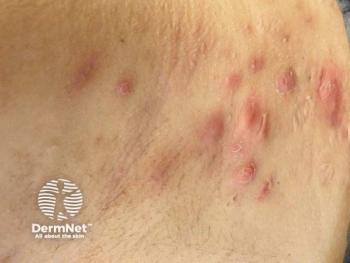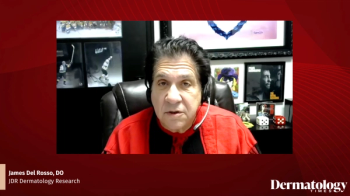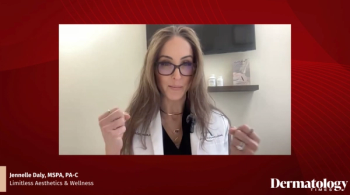
Amy Spizuoco, DO, FAOCD: Addressing STDs and Utilizing Dermatopathology With Care in Diverse Patient Populations
Spizuoco shares pearls from her sessions, "Infectious Diseases: The Story Behind STDs," and "Everything You Need to Know About Dermatopathology and the Dermatopathologist," from the Diversity in Dermatology conference.
Amy Spizuoco, DO, FAOCD, is a dermatopathologist and dermatologist in New York City, as well as the owner and founder of True Dermatology, the past president of the American Osteopathic College of Dermatology, and an associate professor at the Icahn School of Medicine. She is also a member of Dermatology Times' Editorial Advisory Board.
At the
Spizuoco recently spoke with Dermatology Times to discuss pearls and takeaways from her sessions, including the role of dermatologists and dermatopathologists in mitigating the stigmas surrounding STDs, diagnosing skin conditions in diverse populations, ensuring culturally competent care, and more.
Transcript
Amy Spizuoco, DO, FAOCD: Hello, my name is Dr Amy Spizuoco. I am a dermatopathologist and dermatologist in New York City. I am the owner and founder of True Dermatology, and I am the past president of the American Osteopathic College of Dermatology. I'm also an associate professor at Icahn School of Medicine in the dermatology department, and I am on the Editorial Board for Dermatology Times.
Dermatology Times: What are key highlights and takeaways from your sessions at Diversity in Dermatology?
Spizuoco: I gave 2 talks at Diversity in Dermatology. One of them was about infectious diseases and the story behind STDs, and the other one was everything you need to know about dermatopathology and your dermatopathologist. The STD talk was to bring awareness to the STDs that many people face, specifically in different communities and diverse communities. I wanted to bring light what they present as, how to treat them, and how they appear under the microscope, and which ones are diagnosable under dermatopathology. I think it was pretty eyeopening for some people who just don't get a lot of that education, so they were able to understand more about that. My talk about dermatopathology and your dermatopathologist was to explain more to providers what they can expect from their dermatopathologist, when they should use and utilize a dermatopathologist, and what are we saying to them so we can communicate effectively to properly and accurately and precisely treat our patients.
Dermatology Times: What are some common misconceptions or stigmas surrounding STDs, particularly within diverse communities, and how can dermatologists combat them?
Spizuoco: Some common misconceptions and stigmas surrounding STDs, I'll say, particularly in the LGBTQIA+ community are that all of those individuals have STDs or some kind of communicable disease. That's definitely, obviously not the case. Everyone is at risk of getting an STD, not particular groups or individuals based on sexual preference. I wanted to highlight that amongst the attendees, and the providers that were in the audience, and make the providers and the attendees aware that it's their job to communicate that to their patients that if they come in thinking they might have an STD: get some accurate testing and diagnostic testing for them and treat accordingly, and to remind them that everyone is at risk of these STDs, not just specific communities, and they shouldn't feel stigmatized by this at all.
Dermatology Times: What is the significance of dermatopathology in the diagnosis and management of infectious skin diseases in diverse patient populations?
Spizuoco: By doing a biopsy of these lesions, these providers, these dermatology providers, can send these skin samples to the dermatopathologist, and we can look at it under the microscope and determine any kind of cell changes or histology changes, architectural changes, just basics of what we can see under the microscope. But then beyond that, we can do some stains. Gor example, for the different types of HPV in the genital area, some of them are low risk to being cancerous, and some of them are high risk to be cancerous. We can do certain stains on them to determine which ones are higher risk or which ones are lower risk, so hopefully, we can put our patients at ease with the lower risk ones. Then any infections, any bacterial infections, or let's say herpes, they have specific diagnostic criteria under the microscope. Dermatopathology is extremely helpful in deciphering the different types of STDs that can be seen on our patients by using our microscope and our special stains.
Dermatology Times: What are some recent advancements or innovations in dermatopathology techniques that have improved diagnostic accuracy and patient care?
Spizuoco: In developing more and more, we call them special stains. Stains were developed, determining the different risks of HPV infections and lesions, determining the difference between Syphilis. Another immunohistochemical stain that we can do to stain under the microscope. I'd have to say special stains are going to be our best bet in advancing and being able to accurately diagnose these conditions.
Dermatology Times: How do you ensure cultural competency in delivering diagnoses and treatment recommendations to patients of diverse backgrounds?
Spizuoco: All my staff that I have hired, they are probably the most sensitive people I've ever met. We do special meetings weekly to make sure that everyone is on the same page and that we treat everyone with the utmost respect: that everyone is an individual. We don't judge anyone. We're in New York City, fortunately, so my staff happens to be a very diverse group of individuals to begin with. But I really tried to sort out and make the culture of the office just very sensitive and just very empathetic to everyone's needs. I think we're doing a pretty good at accomplishing that.
I would love to say that Diversity in Dermatology has only done this meeting 3 times, but each time it's gotten better and better. They've just selected speakers with different backgrounds to definitely diversify the content and the education that's coming out of there. The attendees are all fantastic, everyone is enthusiastic and eager to learn. I also will just throw out as a dermatopathologist: I want to remind dermatology providers that you really should utilize your dermatopathologist whenever you have any question or concern. Even if you don't want to do a biopsy on a patient, get familiar with your dermatopathologist, give them a call; we're more than happy to get on the phone and discuss different types of conditions that can be seen differential diagnoses, or different types of diagnostic techniques, and then even treatment plans. I just really wanted to put out there that it's important to have a good relationship with your dermatopathologist, because it's just going to help you and your patients get better care and treatment in the long run.
[Transcript has been edited for clarity.]
Newsletter
Like what you’re reading? Subscribe to Dermatology Times for weekly updates on therapies, innovations, and real-world practice tips.










